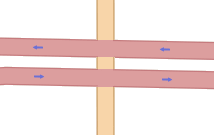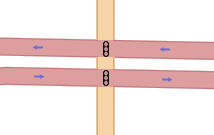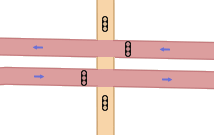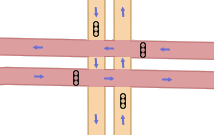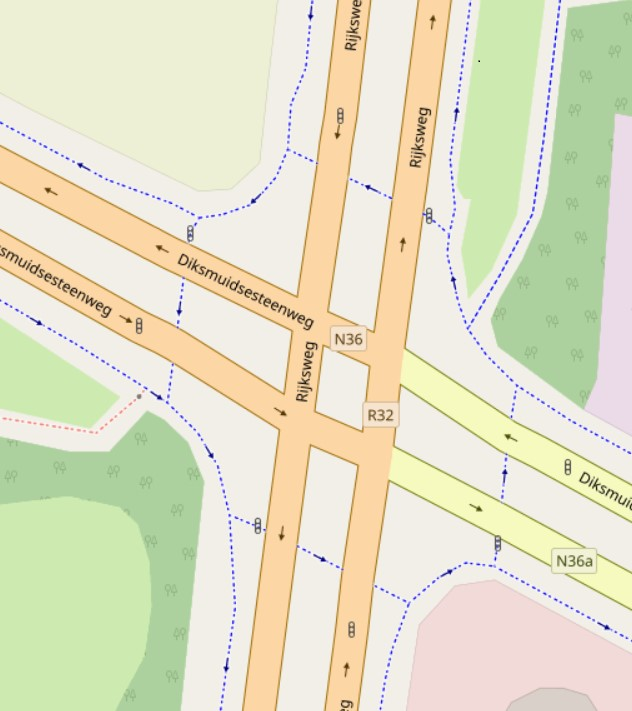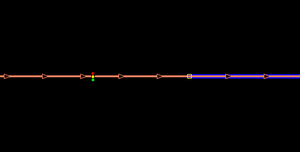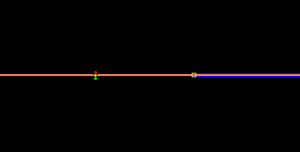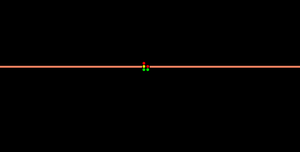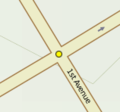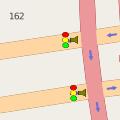Zh-hant:Tag:highway=traffic_signals
| 說明 |
|---|
| 固定循環式交通號誌 |
| 在OSM Carto中渲染 |
| 組: 道路 |
| 用於這些元素 |
| 常用組合 |
| 狀態:習慣使用 |
| 此標籤的工具 |
![]() 交通號誌,又稱交通信號燈,俗稱紅綠燈,設置於道路路口、行人穿越道與其他位置的信號裝置,以控制衝突的交通流量。
交通號誌,又稱交通信號燈,俗稱紅綠燈,設置於道路路口、行人穿越道與其他位置的信號裝置,以控制衝突的交通流量。
標記方法
汽車專用交通號誌
| Key | Value | 元素 | Comment |
|---|---|---|---|
| highway | traffic_signals | 必要,指稱汽車專用的交通號誌。 | |
| ref | * | Reference number or code. | |
| traffic_signals | * | 額外用於指定交通號誌的特殊樣式。 | |
| traffic_signals:direction | forward / backward | 僅適用於分別標記特定方向的交通號誌,指定特定號誌是影響同向車流(=forward)或對向車流(=backward)。 |
行人交通號誌
如果整個穿越道以單一節點呈現,為行人穿越道的highway=traffic_signals額外加入下列標籤。如果行人穿越道以獨立節點標記(強烈建議),為highway=crossing額外加入下列標籤。
| Key | Value | Element | Comment |
|---|---|---|---|
| crossing | traffic_signals | 必要的。指稱行人專用交通號誌。 | |
| button_operated | yes / no | 用於指定交通號誌需要按壓按鈕啟動。 | |
| traffic_signals:sound | yes / no / locate / walk | Whether there are sound signals for visually impaired people. | |
| traffic_signals:vibration | yes / no | 是否有為身心障礙者設計的震動號誌。 | |
| traffic_signals:arrow | yes / no | 交通號誌桿上是否有可用的觸覺箭頭,以指示盲人行人其行人穿越道通往哪個方向 | |
| traffic_signals:minimap | yes / no | 交通號誌桿上是否有小型觸覺地圖,以指示盲人其行人穿越道的分布圖。 | |
| traffic_signals:floor_vibration | yes / no | 行人號誌是否設有地板震動設施,常設於盲人之家附近。 | |
| traffic_signals:floor_light | yes / no | 與交通號誌同步的地板燈號(紅、黃、綠),一般用於使用智慧型手機的行人。 |
繪製方法
The mapping of traffic signals is an abstraction that the particular junction or way is regulated by traffic lights.
It is not a representation of a particular device.
Thus, because traffic signals can affect routing decisions, it is important that they are attached to the ways to which they apply, and not placed beside the way.
Simple intersections
For simple intersections, just tag the intersection node. The same applies to traffic signals which are not part of any intersection, e.g. before tunnels.
Complex intersections
Consider the following intersection:
The horizontal ways are actually one large way, represented by two one-way streets. The problem now is that traffic signals should ideally be applied to each way exactly once. As of now, there is no well established convention on how this problem should be ideally solved, but possible taggings which are currently in use are listed below.
Further discussion is welcome on the discussion page.
Tag all crossings
Add traffic signals to the common nodes in the junction. This will create two separate traffic signals for the vertical way. It is up to the routing software to count nearby signals as one for timing purposes. Many junctions are tagged this way due to simplicity.
Tag all incoming ways
Instead of putting a traffic signal on each crossing, put a traffic signal on all incoming ways of a junction. Traffic signals added to dual-ways need to be tagged with either traffic_signals:direction=forward or traffic_signals:direction=backward to indicate the affected direction. In the given example this applies to the vertical way only, as the horizontal way is mapped with one-ways anyhow.
Tagging also cycleway traffic signals
As before, put a traffic signal on all incoming ways of a junction. The difference is an extended meaning of "incoming ways".
繪製方法(新版)
已命名的交通號誌/交通號誌系統(日本)
在一些國家(例如日本),地方民眾利用交通號誌或交通號誌系統的名稱進行導航,而非使用街道名稱。當街道名可能同時存在時,亦非重要的導航方式。詳情請參見Named spots instead of street names。注意:韓國、尼加拉瓜使用已命名的路口,但被分別標記為junction=yes、reference_point=*,而非highway=traffic_signals。
關於簡易路口(單一節點)或開放路口的單一交通號誌(單一節點),使用帶有name=*標籤的highway=traffic_signals。
注意:請勿在已命名的交通號誌上使用junction=yes。junction=yes只用於已命名的路口(如果節點使用highway=traffic_signals + junction=yes + name=*標記,意謂標籤的名稱為路口的名稱)。
渲染
BlindMap 有音效提醒的行人交通號誌
延伸閱讀
- Relation:enforcement : to define an enforcement traffic signals ;
- type=traffic_signals_set
- Look and Listen Map - Blindmap
- eWorld+SUMO traffic simulation
- Proposed features/Set of Traffic Signals


